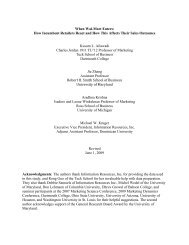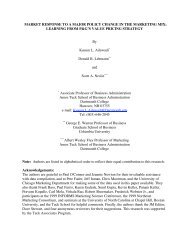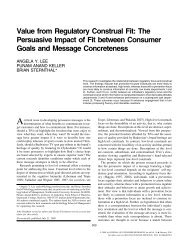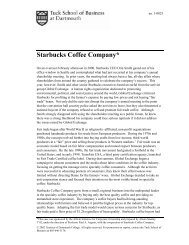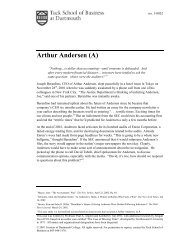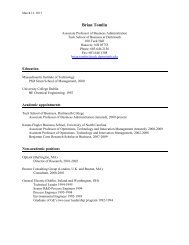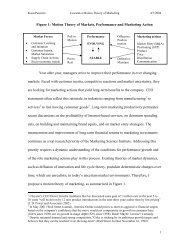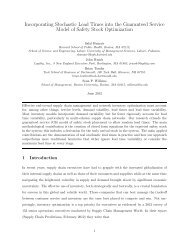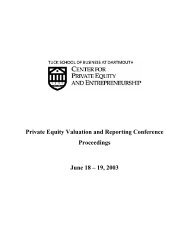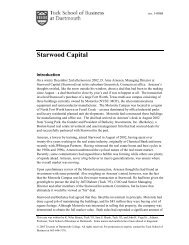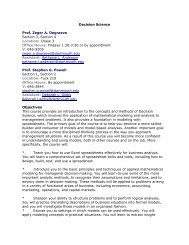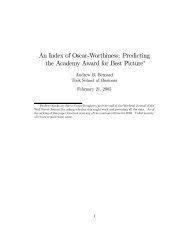tax notes international - Tuck School of Business - Dartmouth College
tax notes international - Tuck School of Business - Dartmouth College
tax notes international - Tuck School of Business - Dartmouth College
Create successful ePaper yourself
Turn your PDF publications into a flip-book with our unique Google optimized e-Paper software.
existing case law and guidance, the adoption <strong>of</strong> the<br />
authorized OECD approach will be very hard in several<br />
jurisdictions without an explicit change in the<br />
wording <strong>of</strong> article 7. 104<br />
In this sense, it is argued that the current wording <strong>of</strong><br />
article 7(3) only allows actual expenses to be taken into<br />
account and not notional expenses, in a way that the<br />
fiction <strong>of</strong> independence <strong>of</strong> the PE, on the basis <strong>of</strong> the<br />
current wording <strong>of</strong> article 7(2), is not complete.<br />
An analysis <strong>of</strong> the history <strong>of</strong> article 7 demonstrates<br />
that the underlying rationale <strong>of</strong> this provision has always<br />
been the separate entity fiction. In this sense, the<br />
outcome resulting from the adoption <strong>of</strong> the single <strong>tax</strong>payer<br />
approach is clearly against this rationale, leading<br />
to an unreasonable reduction <strong>of</strong> the host state <strong>tax</strong>ing<br />
rights.<br />
Despite this, it is worth remembering that the<br />
OECD Committee on Fiscal Affairs recently adopted<br />
the revised commentary on the current article 7 <strong>of</strong> the<br />
OECD model <strong>tax</strong> convention and included it in the<br />
2008 update to the model <strong>tax</strong> convention, which will<br />
be soon published. 105<br />
Also, as mentioned above, the OECD Committee on<br />
Fiscal Affairs intends to implement the conclusions <strong>of</strong><br />
the report not only through a new version <strong>of</strong> the commentary<br />
on the current text <strong>of</strong> article 7, but also<br />
through a new version <strong>of</strong> article 7 itself with accompanying<br />
commentary to be used in the negotiation <strong>of</strong> future<br />
treaties and amendments to existing treaties.<br />
Therefore, although it seems that the most proper<br />
interpretation <strong>of</strong> article 7, on the basis <strong>of</strong> the current<br />
OECD model convention and commentary, requires<br />
the adoption <strong>of</strong> the authorized OECD approach irrespective<br />
<strong>of</strong> any modification in its wording, the necessary<br />
changes to improve certainty on this interpretation<br />
are being made by the OECD.<br />
C. The Need for Consistency<br />
Another argument against the single <strong>tax</strong>payer approach<br />
is that its acceptance would result in applying<br />
the OECD approach in different manners depending<br />
on what type <strong>of</strong> PE is involved.<br />
In this sense, regarding other types <strong>of</strong> PEs, assets<br />
and risks would be attributed to the PE in accordance<br />
with the functions carried on by it, with the consequent<br />
attribution <strong>of</strong> pr<strong>of</strong>its. No one would dispute that<br />
these assets and risks legally belong to the nonresident<br />
enterprise, but are attributable to the PE under the<br />
OECD approach because <strong>of</strong> the functions performed<br />
by that PE. However, once the single <strong>tax</strong>payer approach<br />
is adopted, no pr<strong>of</strong>its would be attributed to an<br />
104 Id. at 57.<br />
105 See http://www.oecd.org/document/52/<br />
0,3343,en_2649_33747_38376628_1_1_1_1,00.html.<br />
agency PE regarding the risks and assets <strong>of</strong> the nonresident<br />
enterprise, even if they arise from activities<br />
carried out through the agency PE. 106<br />
There is no relevant difference between the fixed PE<br />
and the agency PE to justify a different methodology<br />
in attributing pr<strong>of</strong>its to them.<br />
As analyzed above, the single <strong>tax</strong>payer approach is<br />
based on the axiom that the agency PE pr<strong>of</strong>it is zero<br />
by definition. However, there is no empirical, theoretical,<br />
or legal basis for achieving this conclusion. First,<br />
there is no significant difference between the characteristics<br />
<strong>of</strong> a fixed PE and an agency PE that may justify<br />
a difference in treatment regarding the attribution <strong>of</strong><br />
pr<strong>of</strong>its. Second, no convincing theoretical support has<br />
been provided in favor <strong>of</strong> the single <strong>tax</strong>payer approach.<br />
107 Third, nothing in the wording <strong>of</strong> articles 5<br />
and 7 <strong>of</strong> the OECD model seems to support a difference<br />
in treatment. Quite the opposite, the basis for attributing<br />
pr<strong>of</strong>its to all types <strong>of</strong> PEs is precisely the<br />
same provision <strong>of</strong> article 7 and the arm’s-length principle.<br />
Therefore, there is no reason why the attribution <strong>of</strong><br />
pr<strong>of</strong>its to an agency PE should be treated differently<br />
from the attribution <strong>of</strong> pr<strong>of</strong>its to other types <strong>of</strong> PE.<br />
D. Do Not Assume the Law Is Redundant<br />
One <strong>of</strong> the principles that guides the legal interpretation<br />
process is that the law does not have useless<br />
words.<br />
Adopting the single <strong>tax</strong>payer approach would make<br />
article 5(5) <strong>of</strong> the OECD model superfluous and this<br />
outcome is against the principle <strong>of</strong> the effective interpretation<br />
<strong>of</strong> conventions incorporated into the concept<br />
<strong>of</strong> good faith in article 31(1) <strong>of</strong> the Vienna Convention<br />
on the Law <strong>of</strong> Treaties. 108<br />
Indeed, it must be recognized that the adoption <strong>of</strong><br />
the single <strong>tax</strong>payer approach leads to the concept <strong>of</strong><br />
agency PE becoming meaningless, because the pr<strong>of</strong>its<br />
<strong>of</strong> the agency PE will be <strong>tax</strong>ed anyway by its state <strong>of</strong><br />
residence. Therefore, if there is no additional pr<strong>of</strong>it to<br />
be attributed to the agency PE over and above the<br />
arm’s-length reward <strong>of</strong> the dependent agent, there is no<br />
need to have article 5(5).<br />
The characterization <strong>of</strong> an agency PE would have<br />
the sole consequence <strong>of</strong> ensuring that the dependent<br />
agent receives an arm’s-length remuneration. Basically,<br />
once an agency PE is found to exist, the consideration<br />
paid by the nonresident enterprise to its dependent<br />
106<br />
Para. 273 <strong>of</strong> the ‘‘Report on the Attribution <strong>of</strong> Pr<strong>of</strong>its to<br />
Permanent Establishment,’’ Part I (General Considerations),<br />
(2006).<br />
107<br />
Pijl, supra note 9, at 35.<br />
108 Id. at 32.<br />
SPECIAL REPORTS<br />
TAX NOTES INTERNATIONAL FEBRUARY 2, 2009 • 443<br />
(C) Tax Analysts 2009. All rights reserved. Tax Analysts does not claim copyright in any public domain or third party content.



